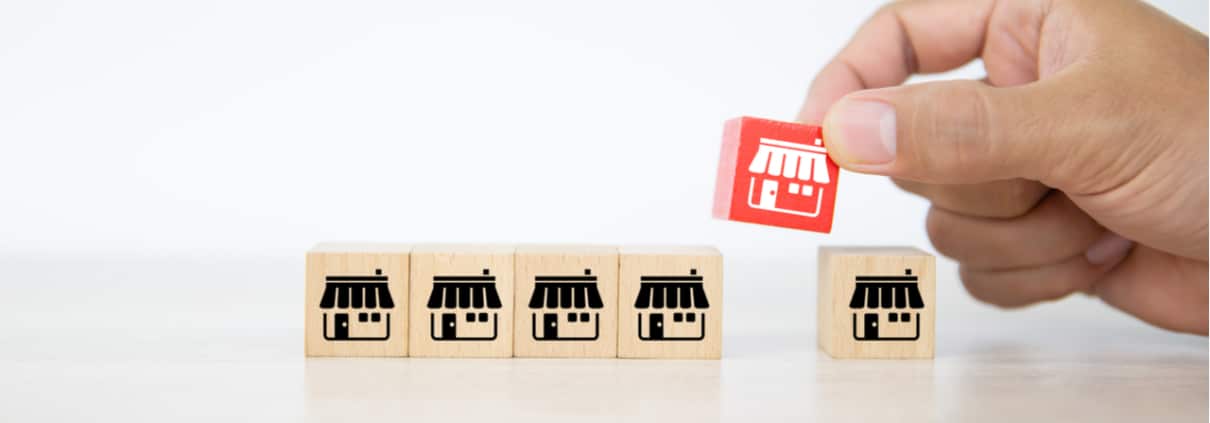What is a franchise?
Franchises are a good option for people who want to be their own boss and run their own business, but are lacking the knowledge or resources to launch a new product or service on their own. Franchising is also a fairly financially-safe way of being your own boss, as there is a much higher rate of survival than in new businesses and startups.
At its core, a franchise is a partnership between an individual (the franchisee) and an existing organisation (the franchisor).
There are three types of franchise systems:
- Product: This is when a franchisor gives a franchisee permission to sell a product using their logo, trademark, and brand name.
- Manufacturing: This is when a franchisor partners with a franchisee to manufacture and sell their products using their logo, trademark, and brand name.
- Business: This is when a franchisor licences their brand to a franchisee and provides regulations around how the business operates and is managed.
How franchises work
A franchisor grants a franchisee the right to market and/or trade their products and services. When a franchisee purchases a franchise, there is an initial fee to the corporation they’re going into partnership with, and they will usually also pay regular royalties to cover the cost of initial and/or ongoing training, business support and marketing.
By paying for the organisation to manage these areas of the business, the franchisee can concentrate on the day-to-day running of their business. They also avoid the cost of organising these services in-house.
The franchisee agreement is a contract which governs the partnership between franchisee and franchisor. Within this, the partnership is tied in for a set period of time – generally between five and twenty years. Once the period of time is up, the contract tends to be renewable.
The history of franchises
The franchising model was created in the 1800s, by Isaac Singer – inventor of the widely-used Singer sewing machine. After the US Civil War in the 1860s, he was mass-producing his famous machines, but needed a system in place that would enable repairs and maintenance to cover the whole country. Initially, local merchants across the US were sold licences that permitted them to service the machines. This then grew to enable the merchants to sell the machines, too. The contract used was the earliest form of franchise agreement.
During the Second World War, companies like Coca-Cola and Pepsi looked to expand quickly and began franchising. As the 1950s and 1960s saw growth in population, economic output and social change, franchising grew in popularity in the UK, especially amongst food retailers such as the fast-food chains Wimpy, McDonald’s and KFC, and ice cream brands Lyons Maid and Mr Softee.
Today, franchising is a function of many established brands across multiple sectors, with franchise opportunities in food, pet grooming, homecare agencies, beauty salons, recruitment companies and many more.
How popular are franchises?
The British Franchise Association’s 2018 bfa NatWest Franchise Survey found that the franchise industry is growing more than ever before. At the time of survey, there were 48,600 franchise units in the UK, and 935 business format franchise systems – around double of what existed twenty years prior.
It’s been widely reported that Millennials are turning to self-employment at a faster rate than any previous generations, and so it is no surprise the results of the franchise survey show this as an attractive option to this group. 18% of franchisees were found to be under the age of 30 – a significant rise in recent years.
With 4 in 10 franchise systems operational from a home office, following the work from home orders issued throughout the recent Covid-19 pandemic, is it possible that this way of working could continue to thrive?
Are franchises a good investment?
The cost of owning a franchise can vary wildly, with the initial fee ranging from £1,000 to £500,000. On top of this, you also need to have budgeted for start-up costs, working capital, monthly rent, salaries, inventory, software and utilities.
The franchise industry contributes £17.2 billion per annum to UK GDP, and employs 710,000 people. The 2018 bfa NatWest Franchise Survey also found that franchises are a largely successful business model, with 93% of franchisees claiming profit. 60% have an annual turnover of more than £250,000.
To ensure franchise business success, a franchisee must first do their due diligence by making sure there is room for expansion in the territory they’ll be working in, understanding how much training and ongoing support will be offered, researching the success of other franchisees, and budgeting and planning for fee payments. With this knowledge, a successful business plan can be written, and a successful future awaits them.
Prepare for success in business
If you have been considering starting your own franchise and are looking to increase your business acumen, the University of York’s 100% online MSc International Business Leadership and Management could equip you with the skills and knowledge you need to succeed.
This online master’s degree will give you a thorough grounding of multiple areas of business, so you will be prepared to take your career to the next level – whether your ambitions lie in opening a franchise or progressing at an existing company.
With us you’ll develop an understanding of business strategy, operations management, finance, leading and managing people, marketing and sales. As you study part-time, you can continue to earn while you learn, applying the knowledge you gain to your existing role. You’ll connect with a global network of peers as you study alongside professionals from all over the world.
